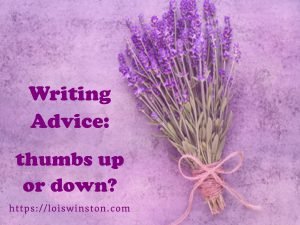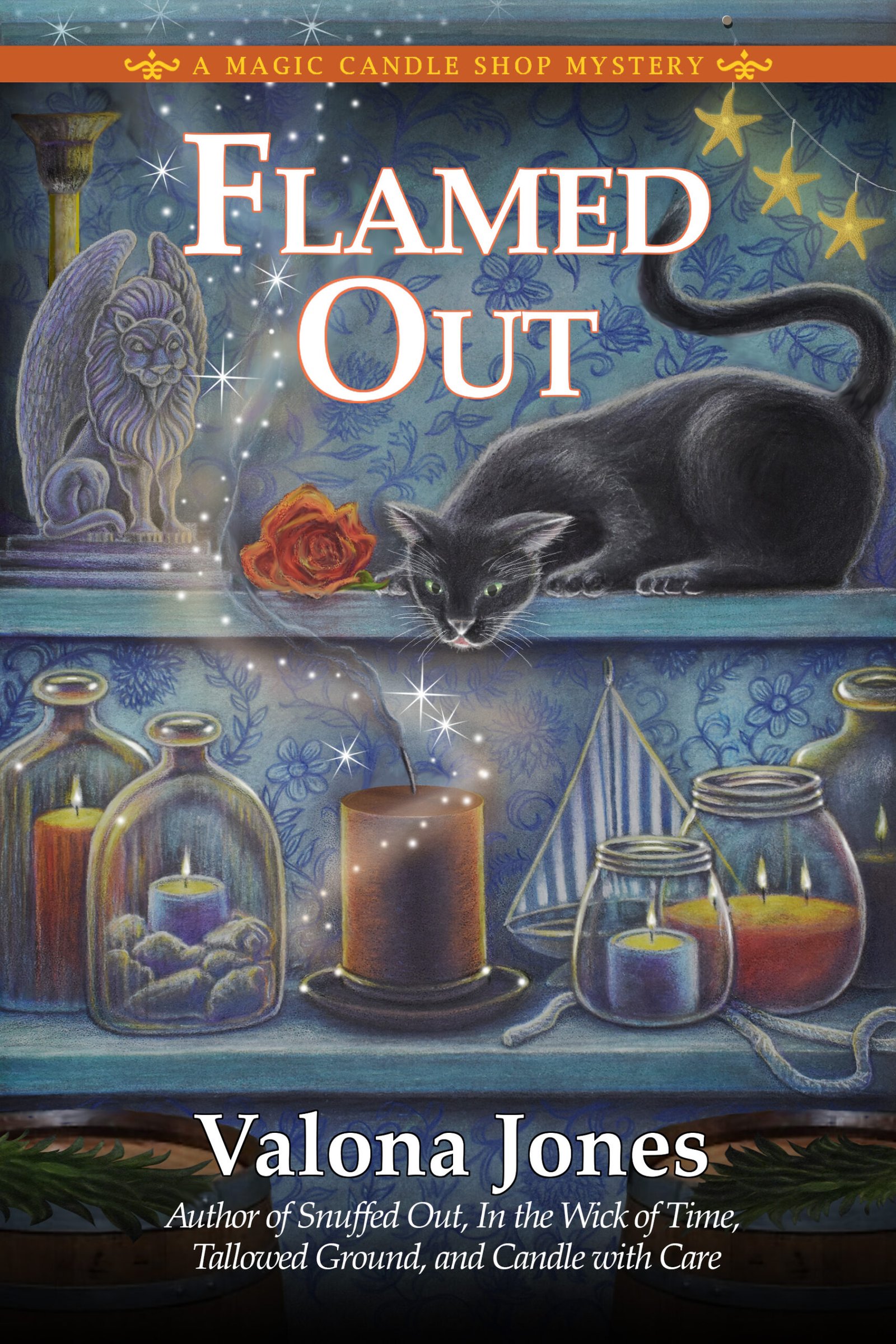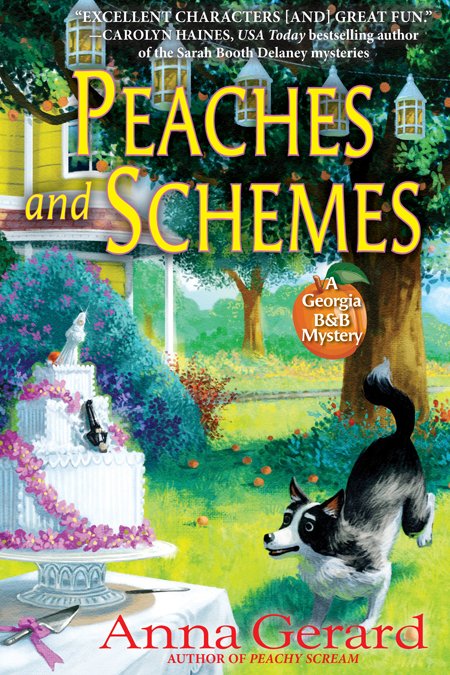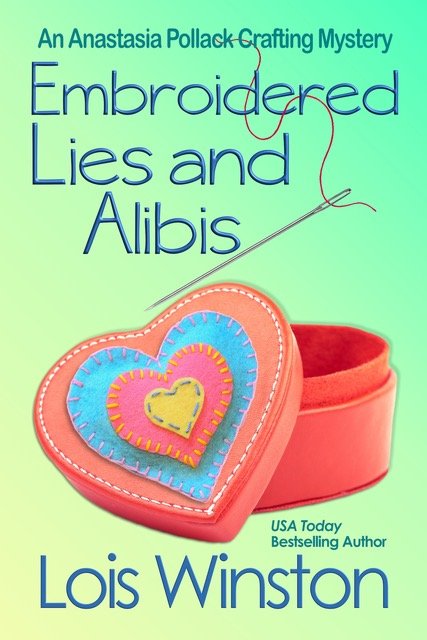Let's Talk with Lois Winston
The Best Writing Advice I’ve Ever Received
Like most people, I’ve received quite a bit of advice in my life. As a kid, it was everything from “Look both ways before crossing” to “Pick your friends, not your nose.” Some advice I took to heart, some I completely ignored (until I matured and learned its value), and some worked for a time but eventually had an expiration date. I also learned that some advice, no matter how well-meaning, is often wrong.
 The same can be said for writing advice. As I was honing my craft, I was bombarded with writerly advice, always given with the best of intentions, but as I later learned, often misguided. The misguided advice usually came from other unpublished writers who passed along information they’d heard at workshops and conferences. Unfortunately, they often took this advice out of context or misheard what was said.
The same can be said for writing advice. As I was honing my craft, I was bombarded with writerly advice, always given with the best of intentions, but as I later learned, often misguided. The misguided advice usually came from other unpublished writers who passed along information they’d heard at workshops and conferences. Unfortunately, they often took this advice out of context or misheard what was said.
One time, an unpublished writer gave me a low score on a writing contest because she’d heard an editor state that in a romance, the hero and heroine must meet within the first five pages. My hero and heroine didn’t meet until the end of the first chapter. If the editor had made such a pronouncement, I’m willing to bet it was in reference to the 50,000-word short romances she edited for Harlequin. I had written a 100,000-word romantic suspense.
Another piece of erroneous information that was constantly bandied about referred to words you should never use, like “was” because it’s passive voice. There’s a big difference between a passive verb and passive voice. “Was” is a passive verb. You can often substitute it for an active verb to improve your sentence. However, “I was sad” is not passive voice. Passive voice is when a subject is acted upon rather than doing the acting. Sometimes the judicious use of a passive verb is the best way to state what needs to be said at the moment to keep the story moving.
There is one piece of writing advice that I swear by, though. It was first told to me years ago by the owner of the agency that represented me, and it’s the best writing advice I’ve ever received:
Every scene in a book, whether narration or dialogue, must do one of two things, either advance the story or tell the reader something she needs to know about the plot or character at that moment. If the scene or dialogue does neither, it’s filler and doesn’t belong in your book.
Too often writers will fill their books with long passages describing the scenery or a character’s clothing. There’s a place for description. The scenery sets the mood and often becomes a character in the story. For example, a story taking place in an isolated village should have a different feel from one taking place in a bustling metropolis. How a character dresses or the extent of his grooming will tell us much about him.
However, when a writer drones on for paragraphs or even pages of description, it pulls the reader from the story. That’s never good. A well-written sentence or paragraph of description is far better than longwinded descriptions that go on for pages and become the writing equivalent of “everything, including the kitchen sink.”
The same is true for dialogue. As humans, much of our daily conversations are filled with nothing but chitchat. Although writers strive to write dialogue that’s realistic to the characters they’ve created, it’s best to cut the chitchat and get right into the meat of the discussion without including what might normally occur when two people meet in real life:
“Hi, how are you?”
“Fine, and you?”
“OK, I suppose.”
“What’s up?”
“Not much. What’s up with you?”
“Same old, same old.”
This is the type of dialogue that will leave readers gritting their teeth, especially if in the end, there was no point to the conversation. It neither advanced the scene, nor told the reader something important she needed to know about the characters or the story. So what is the point of it? There is no point—and that’s my point.
 Do you have a piece of life or writing advice to share? Post a comment for a chance to win a print copy (U.S. only) of either Death by Killer Mop Doll, Revenge of the Crafty Corpse, or Decoupage Can Be Deadly, books 2, 3, or 4 from my Anastasia Pollack Crafting Mystery Series.
Do you have a piece of life or writing advice to share? Post a comment for a chance to win a print copy (U.S. only) of either Death by Killer Mop Doll, Revenge of the Crafty Corpse, or Decoupage Can Be Deadly, books 2, 3, or 4 from my Anastasia Pollack Crafting Mystery Series.
Also, while you’re here, check out our May Book Vault Giveaway! One winner will select the book of their choice from the vault offerings, with print books only available for US winners, though most books are in ebook format as well. The contest runs from May1-18. ENTER HERE.
Posted in Let's Talk, with Lois Winston • Tags: Anastasia Pollack Crafting Mystery Series, Lois Winston, The Best Writing Advice I've ever received | 34 Comments







Author Marilyn Campbell once told me, “Throw a lot of spaghetti on the wall and see what sticks” in terms of my writing submissions. So far I wasn’t having any luck. I’d had six books rejected, varying in genres from romantic suspense to straight contemporary romance. She suggested I write a futuristic romance, the genre where she’d been successful. So I combined my love for Star Trek and reading romance and wrote “Circle of Light” based on a dream I’d had. This sci-fi romance novel was my first published book. It won the HOLT Medallion and became book one in a trilogy written for Dorchester. Sometimes you have to experiment to find the genre that’s right for you.
So true, Nancy. Interestingly enough, my writing career also began with a dream I had one night.
The best advice I had back in time and give out myself to new writers I work with is this: Read Donald Maass’ books on writing. He also has a workbook that a new novelist will find helpful. I was lucky enough to have him as a guest instructor for a day at a conference I hosted one year. What a treat that was for us.
Christine, another great book is Stephen King’s On Writing. Thanks for stopping by and commenting.
The best advice I’ve received is that you should treat your writing like a job. That means it gets the time and priority that you would give to a professional position. That has worked very well for me. The other bit of advice I adhere to is that every journey is different. What works for me may not work for you. It can be overwhelming but when you find your process, it’s magic!
Cheryl, both great pieces of advice. Too many people think authors sit around all day eating bonbons and counting their millions! 😉
It’s okay to miss the bed on the first jump. That was the name of a book about dogs by John O’ Hurley.
LOL, Carol! As long as you don’t hurt yourself!
I agree with your advice about setting, Lois. Even though my Trouble in Paradise mysteries are set in Hawaii, I always try to balance that need to create the ambience with the need to move the story forward. I’d also add that, as a reader, I get extremely bored when writers drone on about the backstory from previous books. A little is great to give a sense of the character, but too often it feels like meeting that person who always has to overshare their life’s experiences. Oh yes, and pronouns. Why is it that so many writers don’t seem to know what they are when writing in third-person?
Terry, it’s always a difficult balancing act when writing a series. Many readers pick up a book in the middle of a series, meeting our characters for the first time. We don’t want them to feel lost, but we also don’t want to overwhelm them with backstory. A little goes a long way.
As for the pronouns, it is a mystery.
One of the best pieces of advice I ever got: If you want to write mysteries, join Sisters in Crime.
Absolutely, Judy! Networking with other mystery authors is so important for both information and support, not to mention the friendships that develop.
“Start your chapter as close to the end of it as possible.” So no chit-chat or sawdust filler. Get to the point and don’t wallow.
Another thing I heard at a conference once: if Agatha Christie had been a member of a critiquing group, would she ever have written The Murder of Roger Ackroyd? One of the classics of the entire genre? The very suggestion had everyone in the room laughing.
Literary tastes change over time, DRS. I think we always need to keep that in mind whenever we read classic books.
The presenter was making the point that an author had to believe in their work and not be put off by those who might not see things the same way or feel too challenged by something really creative and different. I agreed with her.
Makes sense, DRS. Some of the biggest bestsellers and most popular books have been those from authors who dared to write something very different from the norm, often creating entirely new genres.
My personal favorite is “always bring a book.”
Great advice, Alicia! There’s nothing worse than having to wait hours for a doctor’s appointment, and all the magazines in the waiting room are from the last century.
Best two pieces of advice from my college mentor who said I would be published and win prizes (I was only 17 when she made the prediction): “Read everything!” and “Keep a clean narrative line.”
Lev, isn’t it wonderful when teachers and professors recognize our creative gifts?
Unfortunately, the only advice I remember is the stuff that didn’t work. Like having to write a full bio of every main character in the story. That never worked for me. As a lifelong pantser I learned about my characters as I wrote about them. 🙂 Over the years, I’ve learned to give myself advice…and sometimes I even listen!
We also need to listen to our characters, Diane. Mine go on strike when they don’t like what I’m writing about them. ;-D
I’m not a writer, so not writing advice. And I’m still trying to figure the whole “life thing” out, so no advice there either. LOL
I’ll just say, please keep writing cozy mysteries and I’ll keep reading them. 😊
I’ll absolutely do that, Ann. Thanks for stopping by the blog today.
I received lost of advice from writers and non writers, but the best advice I ever got was simple. Keep writing. Just keep writing. You learn by doing, and read writers who can do what you can’t. That advice has been invaluable. Learn, read, write, and keep writing.
Perfect advice, Susan. Thanks for taking the time to comment.
Not a writer so I don’t have writing advice. One thing I learned while speaking in front of groups of people is to do some breathing exercises before you are going on to help relax you.
I’ll have to remember that one, Cherie. Thanks for stopping by.
The best advice I ever received was do your best at editing, then get a pro to help you. I know the industry standard is eight typos/misspellings per 100,000 words, and that may be true if you are an established big name writer, but for those of us who aren’t, make your work as editorially perfect as you possibly can.
Nancy, I’ve never seen that figure. Interesting. Lately, I’ve come across multiple typos and other errors in quite a few traditionally published books from big name, bestselling authors. It makes me wonder if anyone is devoting much time, if any, to reading the manuscripts before they’re turned over to production. Some of the errors I’ve come across certainly should have been caught by the various editors and proofreader who would normally be assigned to a book.
Both Elizabeth George and Anne Perry told me that writing is our job, our profession, so we must treat it as such. Do our job – get up, get dressed, and go to work. I’ve worked from home as a writer for many years. I’d add to that advice by saying keep the television turned off and the refrigerator door closed!
Carolyn, great advice from great authors! As for keeping the television turned off and the refrigerator door closed, I totally agree. However, I have friends who can’t write without the background noise of the TV. One of my friends, a NYT bestselling author, did the bulk of her writing for years on her daily train commute into Manhattan. And then there’s J.K. Rowling who wrote the Harry Potter books in a coffee shop. I need total silence when I’m writing, but other authors claim that the noise around them helps them concentrate more. I guess it goes to prove that we all need to find what works best for us.
“Start in the middle of something” is a phrase that changed my writing world. Before I heard this gem I liked to build up to everything, but it helps to start a book in the middle of something and sometimes I use the same advice to end in the middle of something for scenes and chapters.
Yes, Maggie! It’s always best to open with an inciting event or in the middle of a conversation rather than pages of backstory or description. I also try to end as many chapters as possible with a cliffhanger or in the middle of an event. You always want to give your reader a reason not to set the book aside at the end of a chapter. You want readers to be so invested in what’s happening that they have to turn the page to find out what happens next.